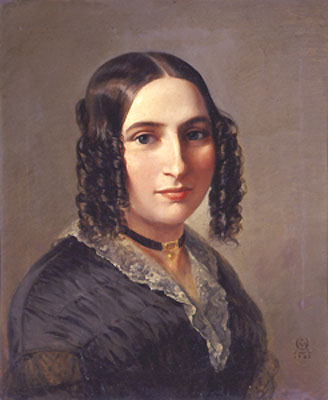This post written in conjunction with research from Hensel Pushers.
Composer and pianist, Fanny Mendelssohn-Hensel and Clara Wieck-Schumann had an uncanny amount in common. Their artistic lives worked in parallel during the 1830s and 40s, in separate cities without meeting until the last months of Hensel’s life. They promoted similarly undervalued repertoire, shared a deep love of Bach, and exercised a massive influence on the artform as we know it.
Born in 1805, Hensel came first of the big-name Romantic Era composers. She was older than her brother, one of his teachers, and a major influence on his music, style, and taste. She was born before Robert Schumann, Richard Wagner, Franz Liszt, Frederic Chopin, and of course, Clara Wieck and Johannes Brahms.
Hensel was a brilliant composer of ingenious works who, like Clara, struggled to have her music taken seriously, though her works were known by and impacted the canon composers around her.
The two women first learned of each other via their connection with Felix.
Crossing Paths
The first mention of Hensel in the Litzmann biography of Clara Wieck-Schumann (where Clara’s diaries are published) is November 1835 in a quote from a letter written by her brother.
The same concert Clara premiered her Piano Concerto, her first concert with Felix conducting in his new post as Leipzig Gewandhaus music director, Clara premiered his B minor Capriccio. “Only think Fanny,” Felix wrote to Hensel after “Wieck’s concert” that “Clara played it like a little demon and I liked it very well.”
In 1837, Hensel wrote to Felix she heard the 17-year-old virtuosa perform in Berlin, but it seems they did not meet. By sad accident, they missed each other during Clara’s year in Berlin too, because in 1840, Hensel was on a trip to Italy.
In 1843, Hensel went with her family to newly married Clara Schumann’s house for an evening in Leipzig, though they don’t seem to have gotten to know each other. Clara was still young, only 24, and Hensel was 38. Robert’s diary notes, “Frau Hensel, whose mind and depth of feeling speak through her eyes,” and we can assume Clara felt the same. Hensel notes hearing Clara play some of her husband’s compositions, but that she did not like them very much.
A Too Short Relationship
In 1847, Clara and her husband were in Berlin for two months and FINALLY Clara and Hensel had a chance to build a friendship. Clara notes she felt at home in the Hensel house, “They are all so kind to me here,” and her “chief attraction” was to Fanny.
Robert’s diary notes they attended one of Hensel’s “big soirées,” famous in the “elegant world of Berlin.” Clara admired Hensel especially as a pianist.
“I have taken a great fancy to Frau Hensel and feel especially attracted to her in regard to music. We almost always harmonize with each other, and her conversation is always interesting, only one has to accustom oneself to her rather brusque manner.”
Clara Schumann’s diary, March 15th, 1847
Hensel felt a similar affinity.
“Frau Schumann comes to me almost every day, and I’ve grown quite fond of her.”
Fanny Hensel’s diary, March 20th 1847
Being Women Composers
One of the reasons I’ve put off doing this blog post is fear of how people might misconstrue and villainize Clara for the following comment. But I ask you to please remember, this is a blatant example of what today we call internalized misogyny. Clara adds about Hensel’s compositions, “Women always betray themselves in their compositions, and this is true of myself as well as of others.”
Statements like this are an example of how Clara was a victim of the prejudiced system around her, and it must be noted—Clara kept her diary as a record for her husband and his opinions too and that he read them.
Clara’s actions, however, as usual, contradict her words. On one of her 4 concerts in Berlin, she performed a Hensel lied (the program doesn’t say which song) alongside probably the first public performance of Clara’s new Piano Trio.
It’s possibly the only time in her career where Clara publicly programmed a work by another woman composer. (Don’t anyone dare condemn Clara for this fact either. It’s a mournful sign of just how much misogyny Clara was surrounded by her whole life.) A fact to be noted and celebrated as proof how much Clara respected and valued Hensel as a musician and composer.
Premature Death and Loss
The impact Fanny Hensel had on the Romantic Era of classical music, its repertoire, and by extension the music we have and love today, is impossible to calculate. Hensel was a major factor in Clara and Robert’s considering a move to Berlin. But Hensel died two months after she and Clara met, and Clara felt it severely.
“I was very much upset by this news, for I had a great respect for this remarkable woman and should very much have enjoyed getting to know her better.”
Clara Schumann’s diary, May 18th, 1847
For more on Fanny Hensel’s follow Hensel Pushers on Twitter or check out the Hensel Pushers website for many of the unpublished works. Also find the complete publication of her lieder at Hensel’s Songs Online.
